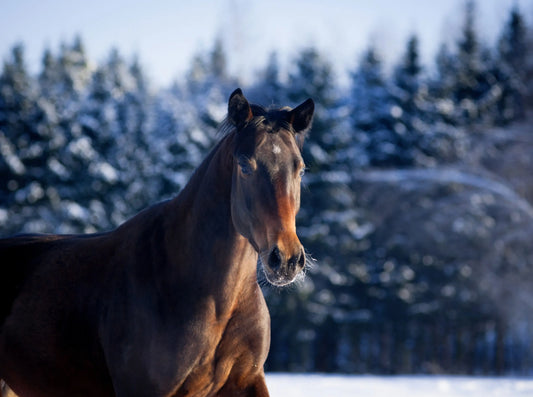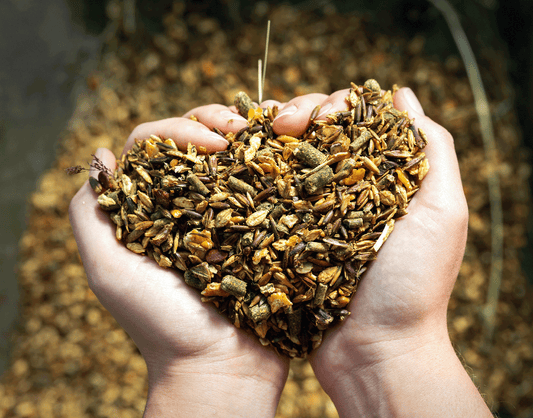Exercise and nutrition in winter: How to keep your horse fit and healthy
3 min

Winter requires adjustments in the care of your horse. In addition to stable care and a safe pasture – which we will discuss in detail in part 1 – the right exercise and nutrition are also essential.
In this second part of our winter guide, we share tips on how to keep your horse fit and healthy during the cold months. From adapted training to extra attention to nutrition and supplements, discover how your horse can survive the winter.
Movement at low temperatures
Regular exercise is essential, even in cold weather. Start with an extensive warm-up at walk to loosen muscles and joints before moving on to trot and canter. Pay attention to slippery areas in the arena and prefer a snow-free and safe surface or ride in the indoor arena.
Adapting training to winter conditions
If there is no indoor arena available and it is slippery or icy outside, adjust your training. Choose lunging or groundwork to improve your horse's balance and coordination. It is important to keep the training fun and to prevent injuries.
Start training with a warm-up and adjust to slippery conditions with groundwork or lunging. Regular movement keeps muscles supple and prevents stiffness.
Foods for a strong immune system
In winter, horses use more energy to stay warm. Provide sufficient high-quality roughage, such as hay, to meet this energy requirement.
Consider supplements such as flaxseed oil or brewer's yeast to support the immune system and improve coat condition.
“Horse winter feed such as high quality hay provides energy to stay warm, supplemented with linseed oil for a strong immune system . Provide fresh, unfrozen water and support joints with supplements such as collagen and hyaluronic acid, especially in older horses. ”
Support for joints and tendons
Joints can feel stiffer in cold temperatures. Supplementing with collagen, chondroitin or hyaluronic acid can help support joint health, especially in older horses or horses with existing joint problems.
Coping with increased alertness in cold weather
Cold weather and wind can make horses more alert and energetic. A magnesium supplement can help support the nervous system and reduce excessive excitability. However, this does not replace the need for adequate exercise and mental stimulation.
Regular coat and hoof care
In winter it is important to take good care of your horse's coat and hooves. Regular brushing stimulates blood circulation and helps prevent skin problems. Make sure the legs are clean and dry after contact with mud to prevent conditions such as mud fever. Check the hooves regularly and use care products if necessary to maintain hoof quality.
Regular winter care for horses, such as brushing and hoof care, prevents skin problems and protects against moisture. Magnesium can help with irritability, but exercise and mental stimulation remain essential.
With these exercise and nutrition tips, you can ensure your horse stays fit and healthy through the winter. Check out part 1 of our winter guide for practical advice on stable care and pasture maintenance.
- Choosing a selection results in a full page refresh.
- Opens in a new window.


